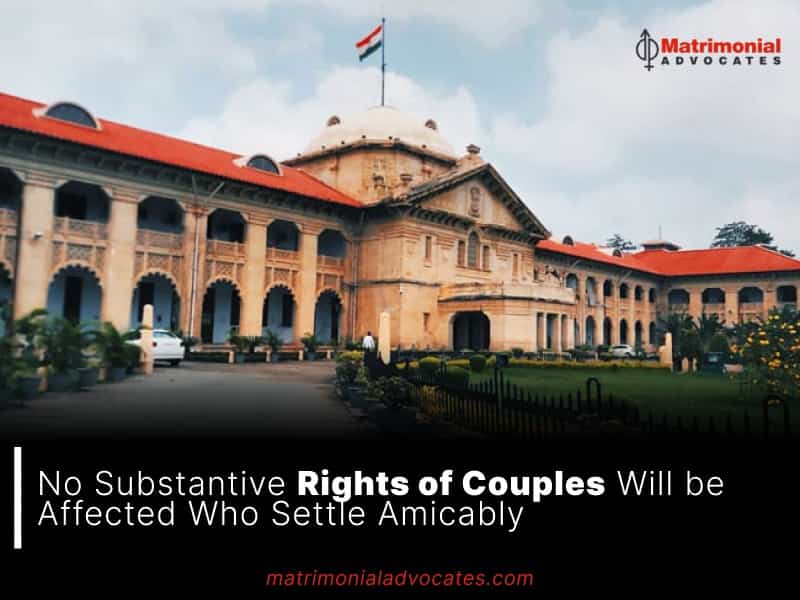
The Allahabad High Court recently waived off the cooling-off period for a married couple because they had mutually filed for dissolution of marriage under Section 13-B of the Hindu Marriage Act, after entering into a Memorandum of Understanding amicably.
The Court said the substantive rights of the two parties who are settling their conflict amicably must not be impeded by citing procedure.
A bench of two-judges, Justice Attau Rahman Masoodi and Om Prakash Shukla observed,
“The Court may note that legitimacy or otherwise of an MOU arrived at between the parties out of their free will is not open to judicial scrutiny except on the ground of fraud. The very idea of settlement through medication or amicable means runs and progresses through this realm of philosophy.”
Factual Background of the Case
The Appellant (Eti Tyagi), and the Respondent (Prince Tyagi) had filed for divorce under Section 13-B of the Hindu Marriage Act on the grounds of irretrievable breakdown of their marriage. As the parties had been living separately for a period of more than a year, the couple had also filed an application seeking an exemption of grant of cooling-off period. However, the Family Court rejected the application based on the bar under Section 13-B of the Act.
High Court’s Verdict
About the 6 months cooling-off period provided under Section 13B (2) of the statute, the Court held that it is procedural in nature.
The Court held, “The mandate of the statute remains procedural. The substantive right of the two parties to settle the conflict by an amicable settlement in a case where the settlement so arrived is free, the law must honour such a right. The amicable means of settlement serve the object of justice which the law fails to deliver between the parties at times giving rise to exceptional situations. This object of all amicable settlements is bound to be respected and recognized by the courts of law in all such cases where the MOU remains unquestionable and the parties have acted upon freely in the pursuit of Article 21 of the Constitution of India to live with dignity.“
It also relied on Amit Kumar Vs. Suman Beniwal case wherein the Supreme Court held that the institution of marriage is to be saved by preventing as well as eliminating hasty dissolution of marriage. However, it granted divorce as the separation had continued on grounds of irretrievable breakdown of the marriage.
“The parties to a marriage if allowed to litigate would also not achieve the purpose of law and would thus damage the institution of marriage in equal measure. It is for the reason that an amicable settlement deserves to be recognized in law with promptitude.”
As a result, the Court waived the cooling-off period and directed that the proceedings under Section 13-B of the Act be finalized within two weeks from the date of filing of the order’s certified copy.
News Source: https://www.livelaw.in/high-court/allahabad-high-court/allahabad-high-court-waives-cooling-off-period-mutual-divorce-section-13b-hindu-marriage-act-236608





